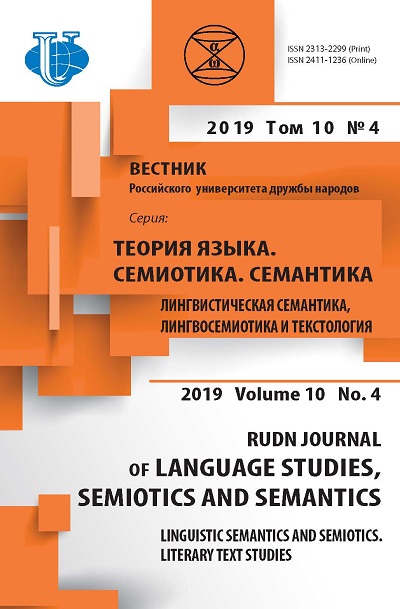Synonymic Traps in Selected English Lexical Semantics Terms
- Authors: Bednárová-Gibová K.1
-
Affiliations:
- University of Prešov
- Issue: Vol 10, No 4 (2019): Linguistic Semantics and Semiotics. Literary Text Studies
- Pages: 754-760
- Section: FUNCTIONAL SEMANTICS
- URL: https://journals.rudn.ru/semiotics-semantics/article/view/22765
- DOI: https://doi.org/10.22363/2313-2299-2019-10-4-754-760
- ID: 22765
Cite item
Full Text
Abstract
The paper zooms in on terminological and conceptual scrutiny of selected eight English lexical semantics terms with the aim of pointing out their terminological synonymy, which is often misrecognized by English linguistics undergraduates. Does a ‘loose synonym’ denote in lexical semantics the same thing as a ‘partial synonym’ or ‘cognitive synonym’? Is the cognitive content of the term ‘false friend’ identical with that of a ‘pseudosynonym’ or ‘paronym’? What aspects of the semantic continuum are shared and non-shared by the selected terms? These questions are at the core of this contribution which can serve didactic purposes of English linguistics teaching. The desk research findings are part of semantic and lexicographic studies and aspire to forewarn English linguistics undergraduates of conceptual misinterpretations in common lexical semantics terms. The paper operates from the perspective of cultural linguistics across the Anglophone semantic continuum. It is based on a tailored Sharifian’s premise [2015] that the metalanguage of English lexical semantics is a repository of cultural conceptualizations that leave traces in its current terminological practice. The study suggests that some English lexical semantics terms offer a considerable space for their synonymic treatment, however, to the detriment of their correct conceptual decoding. The credit of the paper lies in raising undergraduates’ awareness of metalinguistic terminology but also in increasing their conceptual fluency in the selected terms.
About the authors
K. Bednárová-Gibová
University of Prešov
Author for correspondence.
Email: klaudia.gibova@unipo.sk
PhD, Associate Professor of Translation Studies, Institute of British and American Studies, Faculty of Arts, University of Prešov, Slovakia
1, ul. 17 Novembra, Prešov, Slovak Republic, 080 01References
- Sharifian, F. (2015). The Routledge Handbook of Language and Culture. London and New York: Routledge.
- Bednárová-Gibová, K. (2018). Selected Chapters in English Lexicology. Part I: Lexical Semantics and Lexicography. Prešov: Vydavateľstvo Prešovskej univerzity.
- Lee, M.P., Yoon, C. & Mitchell, A.A. (2004). Perceptual and Conceptual Fluency as Antecedents of the Mere Exposure Effect In: Research paper series. URL: https://pdfs.semanticscholar.org/ 9439/fd384d49f2dcc87544a14e80f8641c366670.pdf (accessed: 02.01.2019).
- Cabré, M.T. (1999). Terminology: Theory, methods and applications. Amsterdam and Philadelphia: John Benjamins.
- Dolnik, J. (2007). Lexicology. Bratislava: SPN. (In Slovak).
- Kecskes, I. & Papp, T. (2000). Foreign Language and a Mother Tongue. Mahwah, New Jersey: Lawrence Erlbaum Associates Publishers.
- Langacker, R.W. (2014). Culture and cognition, lexicon and grammar In: M. Yamaguchi, D. Tay, B. Blount (eds.) Towards an Integration of Language, Culture and Cognition: Language in Cognitive, Historical, and Sociocultural Contexts. London: Palgrave Macmillan. pp. 27-49.
- Dolník, J. (2009). General linguistics. Description and explanation of the language. Bratislava: Veda. (In Slovak).
- Bilá, M., Kačmárová, A., Vaňková, I., Gumanová, G., Bednárová-Gibová, K. & Eddy, E. (2018). A Handbook of English and Slovak Linguistic Terminology. Prešov: Prešovská univerzita v Prešove. URL: http://www.pulib.sk/web/kniznica/elpub/dokument/Bila6 (accessed: 03.12.2018).
- Fuster-Márquez, M. (2012). An Introduction to English Lexicology: the Study of Form and Meaning. Valéncia: Universitat de Valéncia.
- Keckes, I. (2014). Intercultural Pragmatics. Oxford: Oxford University Press.
- Goddard, C. (2015). Words as Carriers of Cultural Meaning In: J.R. Taylor. The Oxford Handbook of the Word. Oxford: Oxford University Press. pp. 380-398.
Supplementary files












